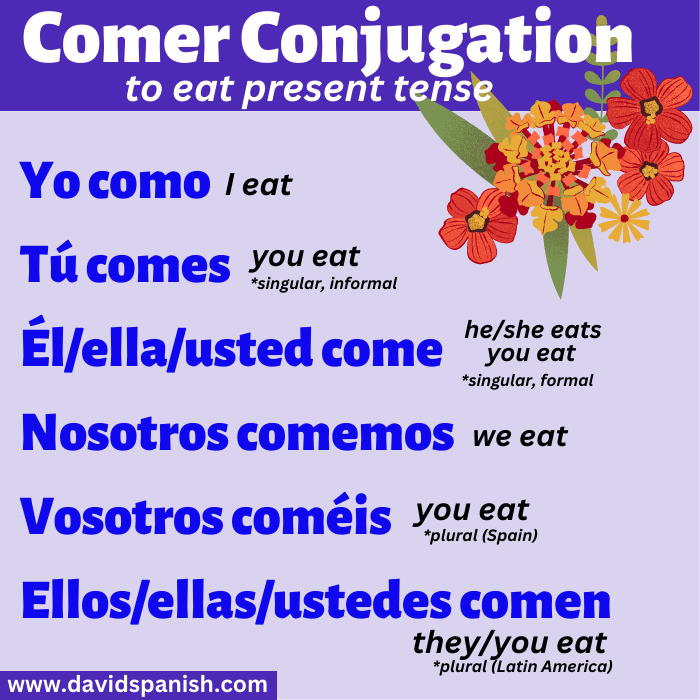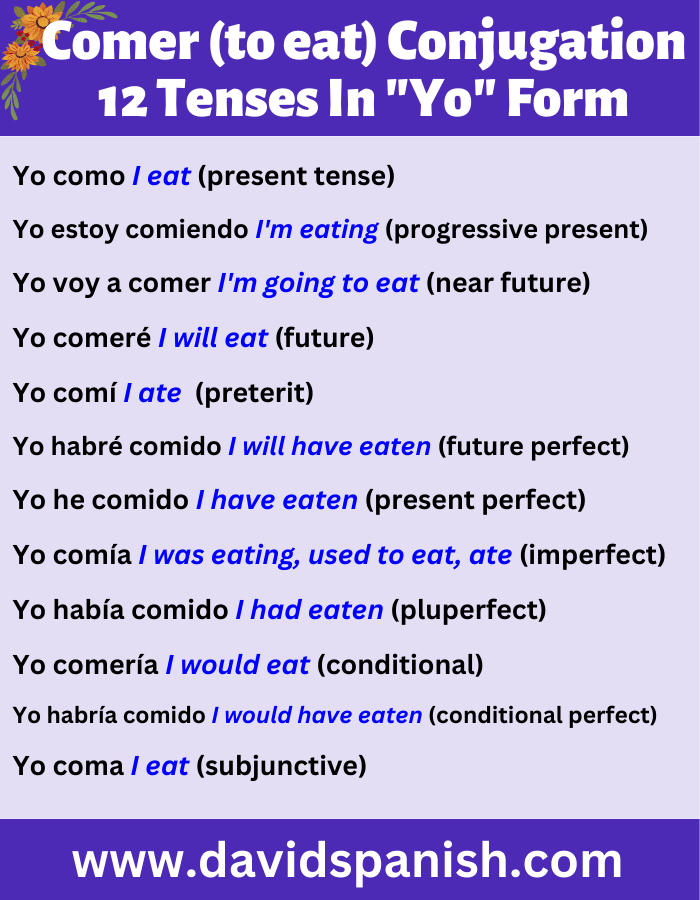The verb comer (Meaning: to eat in Spanish) is an essential verb for students of all levels. The conjugation of comer in the present tense is: Yo como (I eat), tú comes (you eat), él/ella/usted come (he/she eats, you eat), nosotros comemos (we eat) vosotros coméis (you eat) and ellos/ellas/ustedes comen (they/you eat).

Comer is a regular ER verb. This means that when conjugated in the present tense it has no stem changes and its endings are the same as other regular ER verbs. This page on our site covers both regular and irregular Spanish ER verb in detail.
Comer conjugated in the present tense

Further down the page we provide conjugation charts for comer with example sentences in the following ten commonly used verb tenses:
- Present tense (presente de indicativo)
- Progressive present (presente progresivo)
- Near future (futuro inmediato)
- Future tense (futuro)
- Preterite (pretérito)
- Present perfect indicative (perfecto de indicativo)
- Imperfect (imperfecto de indicativo)
- Conditional (potential simple)
- Present subjunctive (presente de subjuntivo)
- Imperative (imperativo)
Comer conjugation table

The following graphic shows the conjugations for comer in the first-person singular(yo) form in twelve verb tenses.

Comer conjugation charts
Present tense (presente de indicativo)
In the present tense, yo como translates to “I eat” and “I am eating”.
| yo como | I eat | Como los tacos. | I eat the tacos. |
| tú comes | you eat | Comes las papas fritas. | You eat the French fries. |
| él/ella, usted come | he/she eats, you eat | Ella come la ensalada. | She eats the salad. |
| nosotros comemos | we eat | Comemos la pasta. | We eat the pasta. |
| vosotros coméis | you eat | Coméis la paella. | You eat the paella. |
| ellos/ellas, ustedes comen | they/you eat | Comen los burritos. | They eat the burritos. |
Progressive present (presente progresivo)
The progressive present is formed by combining the present tense of estar (to be) with the present participle. Yo estoy comiendo transaltes to “I am eating”.
| yo estoy comiendo | I am eating | Estoy comiendo en el mercado. | I'm eating in the market. |
| tú estás comiendo | you are eating | Estás comiendo el desayuno. | You're eating breakfast. |
| él/ella, usted está comiendo | he/she is eating, you are eating | Está comiendo el almuerzo. | He's eating lunch. |
| nosotros estamos comiendo | we are eating | Estamos comiendo la cena. | We're eating dinner. |
| vosotros estáis comiendo | you are eating | Estáis comiendo las tapas. | You're eating bar snacks. |
| ellos/ellas, ustedes están comiendo | they are eating | Están comiendo el postre. | They're eating dessert. |
Near future (futuro inmediato)
The near future tense is used to express action which are going to occur. The tense is formed by combining the present tense if ir (to go) with the preposition a and an infinitive. Yo voy a comer translates to “I am going to eat”.
| yo voy a comer | I am going to eat | Voy a comer con mis amigos. | I'm going to eat with my friends. |
| tú vas a comer | you are doing to eat | Vas a comer en la cafetería. | You're going to eat in the cafeteria. |
| él/ella, usted va a comer | he/she/you is (are) going to eat | Él va a comer con su familia. | He's going to eat with his family. |
| nosotros vamos a comer | we are going to eat | Vamos a comer en diez minutos. | We're going to eat in ten minutes. |
| vosotros vais a comer | you are doing to eat | Vais a comer en un restaurante. | You're going to eat in a restaurant. |
| ellos/ellas, ustedes van a comer | they/you are going to eat | Ellos van a comer las quesadillas. | They're going to eat the quesadillas. |
Preterite (pretérito)
The preterite tense is used to express past actions which occurred at specific times. Yo comí translates to “I ate”.
| yo comí | I ate | Comí a la cinco. | I ate at five o'clock. |
| tú comiste | you ate | ¿Qué comiste ayer? | What did you eat yesterday? |
| él/ella, usted comió | he/she, you ate | ¿Por qué no comió con sus hermanos? | Why didn't he eat with his brothers? |
| nosotros comimos | we ate | Ya comimos, gracias. | We already ate, thanks. |
| vosotros comisteis | you ate | Comisteis los churros? | Did you eat the fritters? |
| ellos/ellas, ustedes comieron | they/you ate | Comieron las guayaba. | They ate the guavas. |
Present perfect indicative (perfecto de indicativo)
The present perfect tense is used to express past actions which have a bearing on the present. Yo he comido translates to “I have eaten”.
| yo he comido | I have eaten | Ya he comido con los niños. | I've already eaten with the kids. |
| tú has comido | you have eaten | ¿Por qué no has comido? | Why haven't you eaten. |
| él/ella, usted ha comido | he/she/you has (have) eaten | Ella todavía no ha comido. | She still hasn't eaten. |
| nosotros hemos comido | we have eaten | Hemos comido en este restaurante tres veces. | We've eaten in this restaurant three times. |
| vosotros habéis comido | you have eaten | Habéis comido la tapas en la terraza. | You've eaten the bar snacks on the terrace. |
| ellos/ellas, ustedes han comido | they/you have eaten | Ya han comido con sus primos. | They've already eaten with their cousins. |
Imperfect (imperfecto de indicativo)
The imperfect tense is used to express past actions which occurred at unspecified times. Yo comía translates to “I was eating”, “I used to eat” and “I ate”.
| yo comía | I was eating (or used to eat, ate) | Cuando era niño, comía la pizza todas las semanas. | When I was a child I used to eat pizza every week. |
| tú comías | you were eating | ¿Dónde comías en la universidad? | Where did you used to eat in university? |
| él/ella, usted comía | he/she/you was (were) eating | En el pasado comía mucha comida chatarra. | In the past he used to eat a lot of junk food. |
| nosotros comíamos | we were eating | Comíamos el postre cuando papó volvió a casa. | We were eating dessert when dad got home. |
| vosotros comíais | you were eating | ¿Qué comíais cuando vivíais a Sevilla? | What did you used to eat when you lived in Seville? |
| ellos/ellas, ustedes comían | they/you were eating | Comían el helado cuando María se puso a cantar. | They were eating ice cream when Marie starting singing. |
Conditional (potential simple)
The conditional tense is used to express hypothetical actions. Yo comería translates to “I would eat”.
| yo comería | I would eat | Comería si tuveria hambre. | I'd eat if I were hungry. |
| tú comerías | you would eat | ¿Qué comerías si tuvieras más dinero? | What would you eat if you had more money? |
| él/ella, usted comería | he/she/you would eat | Comería con nosotros pero ya tiene planes. | He's eat with us but he already has plans. |
| nosotros comeríamos | we would eat | Comeríamos con ustedes si tuviéramos más tiempo. | We'd eat with you if we had more time. |
| vosotros comeríais | you would eat | Comeríais el bistec si fuerais vegano. | You'd eat the steak if you weren't vegan. |
| ellos/ellas, ustedes comerían | they/you would eat | Comerían tacos si estuvieran a México. | They'd eat tacos if they were in Mexico. |
Present subjunctive (presente de subjuntivo)
The subjunctive is used to express wishes, emotions and doubts. Yo coma translates to “I eat”.
| yo coma | I eat | Él quiere que coma un poco más. | He wants me to eat a bit more. |
| tú comas | you eat | Es importante que comas antes de trabajar. | It's important that you eat before working. |
| él/ella, usted coma | he/she eats, you eat | Dime cuando coma la cena. | Tell me when you eat dinner. |
| nosotros comamos | we eat | Ella quiere que que comamos las verdura. | She wants us to eat the vegetables. |
| vosotros comáis | you eat | ¡Exijo que comáis con los adultos! | I require that you eat with the adults. |
| ellos/ellas, ustedes coman | they/you eat | Es necesario que coman todo. | It's necessary that you eat everything. |
Imperative (imperativo)
The imperative mood is used to give commands and make suggestions. Example sentences are under the chart.
| (tú) ¡come! | Eat! | ¡no comas! | Don't eat |
| (usted) ¡coma! | Eat! | ¡no coma! | Don't eat |
| (nosotros) ¡comamos! | Let's eat! | ¡no comamos! | Let's not eat! |
| (vosotros) ¡comed! | Eat! | ¡no comáis! | Don't eat |
| (ustedes) ¡coman! | Eat! | ¡no coman! | Don't eat |
- ¡Come la verduras! Eat the vegetables!
- ¡Comamos la enchiladas! Let’s eat the enchiladas!
- ¡Co comas demasiado azúcar! Don’t eat too much sugar!
- ¡No coman el postre antes de comer el plato principal! Don’t eat dessert before eating the main dish!
Discover more:
- Ser Conjugation: How to Conjugate “To Be” in Spanish
- Leer Conjugation: How to Conjugate to Read in Spanish
- Querer Conjugation: How To Conjugate To Want In Spanish
- Dar Conjugation: How To Conjugate “To Give” In Spanish
- La Bamba Meaning, Spanish Lyrics & English Translation - May 4, 2024
- Bésame Mucho Meaning, Spanish Lyrics & English Translation - May 3, 2024
- Querida – Lyrics, Meaning & Translation - May 2, 2024
